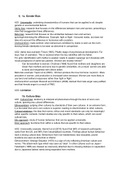AO1: Universality: underlying characteristics of humans that can be applied to all; despite
genetic or environmental factors.
Alpha bias: research that focuses on the differences between men and women, presenting a
view that exaggerates these differences.
Beta bias: research that focuses on the similarities between men and women;
ignoring/minimising the differences. Example: fight or flight - favoured males, but does not
take into account the difference in hormones with ovulation.
Androcentrism: male-centred; when behaviours exhibited by males is seen as the norm,
leaving female standards to be seen as abnormal in comparison.
AO2: Alpha bias example: Freud (1905). Phallic stage of psychosexual development. For
boys: fear of castration. This is resolved when the boy identifies with the father.
For girls: identification with mother is weaker; leads to weaker superego as it develops with
moral perspective of same-sex parents. Women are morally inferior?
- Can be beneficial to women; Chodrow (1968) found that mothers and daughters are
closer than mothers and sons due to genetic similarities. As a result, women are able
to bond and empathise with others better.
Beta bias example: Taylor et al (2000) - Women produce the love hormone ‘oxytocin’. More
prevalent in women, and production is increased when stressed. Women are more likely to
use tend and befriend responses rather than fight or flight.
Androcentrism example: Brescoll and Uhlmann (2008) claimed that male anger was justified,
and that female anger is a result of PMS.
AO3: Limitation: -
1b. Culture Bias
AO1: Cultural bias: tendency to interpret all phenomena through the lens of one’s own
culture, ignoring any cultural differences.
Ethnocentrism: judging other cultures by standards of their own cultures. In an extreme form,
it is the belief that one’s own culture is superior, leading to discrimination to other cultures.
Cultural relativism: the idea that norms, ethics and moral standards can only be meaningful
within specific contexts. Certain studies are only specific to that culture, which can avoid
cultural bias.
Etic approach: study of human behaviour that can be applied universally.
Emic approach: functions from within a culture that are specific to that culture.
AO2: Universality example: Henrich et al (2010) found that 68% of research participants
came from the US, and 96% from industrialised countries. Findings about human behaviour
have a strong cultural bias. Behaviours from non-westernised, less educated, poorer
locations are seen as abnormal or inferior.
Ethnocentrism: Strange Situation (1970) is a sign of only reflecting American culture and
norms. The attachment type which was seen as ‘ideal’. In other cultures such as Japan -
Takahashi (1986) are classed as insecurely attached due to showing distress on separation;
due to Japanese babies rarely being separated from mothers.
, Cultural relativism: Berry (1969) found distinction in etic and emic approaches. Argues that
most studies in psychology are imposed etic, where the theories only came as a result of a
single culture. Ainsworth and Bell research is imposed etic as they took the findings from
American culture and tried to apply ideal attachment type universally.
AO3:
- P: Most studies in psychology are culturally biased. E: feature of many studies of
social influence. E.G. Asch and Milgram mainly used white, middle-class men.
Replications caused different results. Collectivist cultures found more conformity than
individualists. E: understanding of topics such as social influence should only be
applied to individualist cultures.
- P: issue of the past/outdated. E: in the past, psychologists referred to cultures as
individualist-collectivists. But since global interconnectedness, it has reduced.
Takano and Osaka (1999) found that 14/15 USA v Japan studies found no distinction
between individualism and collectivism. E: cultural bias may be less of an issue
today.
- P: conducting cross-cultural studies can challenge Western way of thinking. E: being
aware of the knowledge and concepts that are not shared across cultures can
promote sensitivity to individual differences. E: new techniques; counteract scientific
racism displayed in psychological theories, to make conclusions more valid.
2) 2a. Free Will
AO1: Free will: the notion that humans can make choices and their behaviour/thoughts are
not influenced by biological/external factors. Does not deny the existence of biological or
external factors, but rather that we can reject these if one wishes as the individual is in
control.
AO2: Humanistic approach; Maslow (1943) - hierarchy of needs, sets apart from other
species, self-actualization.
AO3: STRENGTH:
- P: compared to determinism, it has practical value. E: even if free will is not truly a
concept, the idea that humans have free will improves mental health. E: Roberts et al
(2000) found that the adolescents that believed in hard determinism were more likely
to develop depression later on in life. Locus of control - less likely to be optimistic. E:
even if we do not have free will, the belief that we do can have a positive impact on
mind and behaviour.
LIMITATION:
- P: scientific evidence (brain scan) does not support it, but supports determinism. E:
Libet et al (1983) told participants to flick wrist at random times while measuring brain
activity. Participants thought they made a conscious decision when to do so, but
Libet found that their unconscious brain made the decision half a second before. E:
even basic experiences are determined by our brain before we are aware that it is to
happen.
- COUNTERPOINT: involvement of the brain in decision making is known, and just
because the action comes before conscious awareness, does not mean that there
was no decision to it. Conscious awareness is a read out of unconscious decisions -
not appropriate evidence to challenge free will.



